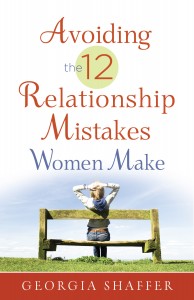 Relationships are challenging. And we all make mistakes.. But Georgia Shaffer, author of Avoiding the 12 Relationship Mistakes Women Make, believes there are 12 that are common to all of us, and we can avoid them if we can first identify them and then do the work to overcome them. In addition to authoring several books, Georgia is a licensed psychologist in Pennsylvania, a Christian life coach, and a professional speaker who is a charter member of AACC’s International Christian Coaching Association. Her story and photos are featured in the film Letters to God, where she shares her story as a cancer survivor who was told over 22 years ago that she had a two percent chance of living another 10 years.
Relationships are challenging. And we all make mistakes.. But Georgia Shaffer, author of Avoiding the 12 Relationship Mistakes Women Make, believes there are 12 that are common to all of us, and we can avoid them if we can first identify them and then do the work to overcome them. In addition to authoring several books, Georgia is a licensed psychologist in Pennsylvania, a Christian life coach, and a professional speaker who is a charter member of AACC’s International Christian Coaching Association. Her story and photos are featured in the film Letters to God, where she shares her story as a cancer survivor who was told over 22 years ago that she had a two percent chance of living another 10 years.
It’s a privilege to be able to spend some time with Georgia so she can share bits of her wisdom with you all. I’m excited about what you’ll hear from her. And, by the way, Men, don’t let the title fool you. This is for you too.
Linda: In your book, Avoiding 12 Relationship Mistakes Women Make you talk a lot about relational blind spots. We can all relate to the idea of having visual blind spots when driving, but what do you mean by the term “relational blind spot”?
Georgia: A relational blind spot is our inability to see things in ourselves, or in others close to us, as they really are. A blind spot may also be something we do notice but discount as not important when, in fact, that thing is very significant. About 80 percent of the time, we see our connections with others accurately. But 20 percent of the time, we only think we see ourselves or our relationships clearly, when, in fact, we do not. Unfortunately, self-deception is not the exception.
Linda: What led you to write about relational blind spots in this book?
Georgia: Years ago when I was researching for a previous book, I came across the concept of “psychological blind spots.” The source did not refer to them as “relational.” As I thought about how they impact our interactions with others, I decided to call them “relational blind spots.” What’s interesting is that I never learned about these blind spots, even though I’m a licensed psychologist in Pennsylvania. It was a new concept for me.
As I spoke about relational blind spots at retreats and conferences, I realized I wasn’t the only one that didn’t know about their existence.
Our relational blind spots are so important. Jesus talks about them in Matthew 7:3 when he says we fail to pay attention to our blindness. I wrote Avoiding the 12 Relationship Mistakes Women Make to help more people understand that we all have relational blind spots, what they are, and how we can minimize their destructive impact.
Linda: You talk about this for women. But I don’t want to let the men off the hook here. So tell me, do men have relational blind spots too?
Georgia: Even though the book focuses on women, men have the same blind spots as women do.
Common Blind Spots
Linda: What is one of our most common blind spots?
Georgia: The blind spot of failing to pay attention to our limitations.
Just like a gas tank has a limited capacity and needs to be refilled to keep a car running, we have a limited amount of financial, physical, mental and emotional resources. If we fail to pay attention to our limits, rather than accepting and accommodating for them, our relationships suffer. Sometimes the relationship consequences of this failure are minor. We might just become mildly annoying and people might wish we would just relax. Other times, failure to heed our limitations can cause irreparable damage—like a divorce.
Rather than ignore our limitations, we need to embrace them. God created us with our particular limitations, so we honor him when we learn to live within them.
We need to be intentional about taking time to recharge and renew ourselves—physically, emotionally, and spiritually. When I’m trying to do too much too fast, that’s usually when I am most crabby with those around me. Unfortunately, too many times I don’t realize how irritated or exhausted I am until I hurt someone’s feelings.
If your readers are interested in knowing all 12 of the relationship mistakes we make, they might want to visit the free resources page at www.GeorgiaShaffer.com for a complete list.
Linda: Once we realize we have blind spots, what can we do to protect our relationships from the destructive blind spots? Could you give us at least two examples?
Georgia: First, seek God’s wisdom: Jesus told his disciples, “Blessed are your eyes because they see, and your ears because they hear” (Matthew 13:16 NIV). To be like that, we need to pray that the Holy Spirit, the spirit of truth, will guide us and show us what we miss.
Second, listen to wise counsel: Since we can miss what is obvious to others, seeking and listening to wise counsel is vital. Other people usually have a clearer understanding of our shortcomings than we do. A neutral, trustworthy, wise person can give us insight into a difficult situation. In Proverbs 15:31 NLT, we read, “If you listen to constructive criticism, you will be at home among the wise.”
Be sure, however, to seek counsel only from safe, godly people you have learned are trustworthy. Don’t go around asking everyone’s advice. If you do, you will be sure to get bad advice.
Becoming Self-Aware
Linda: You say that to have healthy relationships we have to see ourselves as we really are.  What are some characteristics of people who are self-aware?
What are some characteristics of people who are self-aware?
Georgia: People who rate high in self-awareness are:
– Clear about what they do well and how they can help others
– Aware of their flaws and hidden motives
– Willing to spend time on self-reflection
– Open to learning from their mistakes
One research study of top performers in a work setting found that 83 percent of them also rated high in self-awareness. If you want to be a top performer in your relationships, then you will cultivate self-awareness.
Linda: Another interesting blind spot you write about is “Thinking we are the exception to the rule.” Tell me more about that.
Georgia: We incorrectly assume that other people’s experiences don’t apply to our lives. We do this often. We think we’re different somehow. A friend who read a draft of Avoiding the 12 Relationship Mistakes Women Make told her husband about the illustration I used to discuss this blind spot. I talk about the visual blind spots we have on either side of a car’s front windshield. Unless we move our head forward and backward, something like a truck or pedestrian can be hidden behind the frame that supports the windshield.
“My car doesn’t have that blind spot,” her husband said. A few weeks later, however, he came home from work, shaking.
“What happened?” my friend asked”
“I barely missed hitting a truck that was hidden by that blind spot on the side of my windshield. . . I guess I do have that blind spot after all.”
Although you are unique, that does not necessarily mean you are exceptional. As Romans 12:3 says, “Do not think of yourself more highly than you ought, but rather think of yourself with sober judgment.”
Linda: While I know we can’t avoid all misunderstandings and conflicts, what is another thing we can do routinely to minimize relational difficulties?
Georgia: Be willing to cultivate self-awareness. Take time for reflection, asking God to help you see yourself as you are and to understand that he loves and accepts you as you are—the good parts and the unflattering ones.
At first, seeing ourselves as we are is uncomfortable. Once we make that breakthrough, we can make wiser decisions. Most importantly, we can experience the relational freedom God intends for us to enjoy.
Linda: Thanks, Georgia. This has been helpful in looking at some of the relationship mistakes we make. Tell us again where we can learn more about the other relational blindspots and where we can find more about your book, 12 Relationship Mistakes Women Make. Also, some readers today may want to know how to find out more about your other books, including the one about surviving cancer, as well as your ministry and coaching.
Georgia: Avoiding the 12 Relationship Mistakes Women Make, along with the other books I’ve written, is available at www.GeorgiaShaffer.com on the book page. It can also be found at all online bookstores such as Amazon.com and Barnes and Noble.





Speak Your Mind